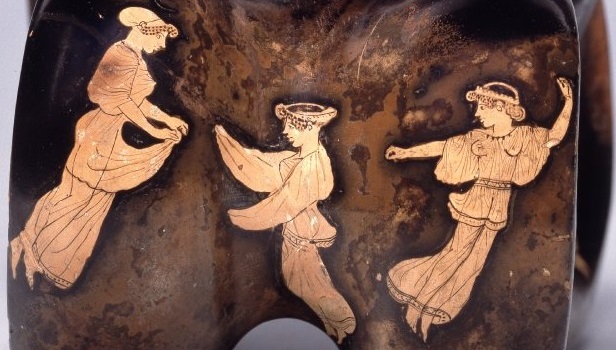
February 19, 2014, by Helen Lovatt
Aristophanes in London
Last week saw the students of both UCL and KCL put on their annual Classical plays. That gave Oliver Thomas the opportunity to see two of Aristophanes’ comedies on the same day – UCL’s Clouds, performed in translation, and KCL’s Wasps, performed in Greek with English surtitles.
Two productions of early Aristophanes plays, but two very different approaches.
UCL’s Clouds was directed jointly by Kyriaki Ioannidou (a postgraduate student working on Menander) and João Fisher (a classics undergraduate). Their programme notes on the directorial vision both contained – I sense – heartfelt reference to artistic differences. Ioannidou speaks of ‘recreat[ing] the essence of an ancient production’, while Fisher declares his Brazilian suspicion of this ‘sacrosanct respect’ for the ancient way of doing things.
What constituted the ‘essence’ of an Aristophanic production? It’s a question any modern director of Aristophanes has to face, and I blogged a bit about it here when I was producer for the Frogs in Cambridge last year.
Ioannidou’s conception dominated, with ancient Greek costumes and a balletic chorus chanting to a Greek-inflected score; the fairly literal translation (John Claughton and Judith Affleck) received only rare additions, though some successfully reached through the ‘fourth wall’, such as at line 92: ‘Do you see that door, son? That’s… the fire exit. But the next door along is Socrates’ Thinkstitute…’.
Undoubtedly, the infectiously committed performances by Strepsiades (Felix Medd) and Socrates (Dom Hauschild), as well as good cameos for Better Argument and a ‘freakish’ cloud, carried the show along. But the original appearance and text hid more than it revealed of what’s ‘essential’ about Aristophanes to me. For instance, by choosing to ham up Socrates-in-a-false-beard, and not to refurbish the Thinkstitute and its contents as (say) contemporary UCL, satire yielded too much ground to pantomime.
Rosa Wicks, who directed the KCL Wasps, expressed a very different goal in her programme note: to mimic Aristophanes’ absurd juxtapositions.
The KCL tradition (since 1953) of performing plays in ancient Greek comes with an obvious set of problems. Learning one’s lines is monstrously hard, as is delivering them to the satisfaction of a pedantic classicist, in sync with the surtitles. Those difficulties were all in evidence on the first night, but beyond them lay plenty of laughs.
In my favourite scene, one dog (here, neatly, ‘Demadogue’, played by Harry Sharpe) accuses another of stealing some cheese, complete with testimony from the grater; Demadogue, clad in a canine onesie, oscillated with suitable absurdity between his plummily pronounced prosecution and having another actor tickle his tummy. Several chorus-members shone in a jazzy score by the multitalented Professor of Classical and Comparative Literature, and Aristophanes expert, Michael Silk. At one point, they sang a snatch of Hey Jude – perhaps parodying the Cambridge Greek Play parodying Hey Jude last October.
One particular update gave me special pleasure: twerking. Not for THAT reason… In a forthcoming article for Classical Quarterly I discuss some Greek verbs meaning (in prudish lexicographer-speak) ‘to sway the lower spine suggestively’. Though I refrained from shoehorning ‘twerk’ into my article (I don’t suppose the verb will last), I had made the connection. A related verb in the Wasps cued an all-too-vivid Miley Cyrus impression, complemented of course with a strap-on phallus. Though the original verb is used about pretentious prancing, twisting it into a twerk brilliantly combined Aristophanes’ obscenity with his love of ridiculing Athenian celebrities through absurd context-switches. It even cohered with an earlier Miley reference in the imaginative surtitles by Rebecca McNamara and Katerina Velentza.
These two shows aimed at quite different things. To put it broadly, Clouds stuck more to the letter, Wasps – despite using the original Greek text – more to the spirit of the original. But both programmes mentioned, quite rightly, the aim of attracting people to Aristophanes, and both audiences contained a healthy number of schoolchildren for whom this could be the crucial first impression. Time will tell whether more were bitten by the bug by Wasps, or taken by storm by the Clouds.
Image: dancing female clouds. Attic pot in the shape of a knucklebone, attributed to the Sotades Painter, c.460. British Museum E804, © Trustees of the British Museum
No comments yet, fill out a comment to be the first

Leave a Reply